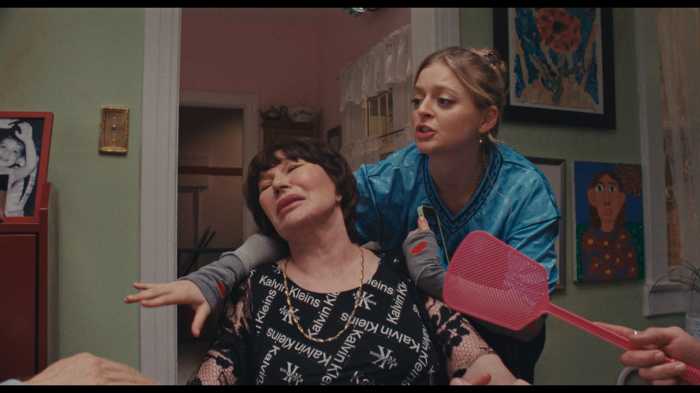Bruce David Klein’s “Liza: A Truly Terrific Absolutely True Story” presents Liza Minnelli as an icon, rather than a real, complex person. Speaking about her problems with substance misuse, it champions her vulnerability, yet her recovery from addiction to alcohol and Valium becomes an opportunity to prove she’s a survivor. (Fed amphetamines by MGM when she was a child, her mother Judy Garland struggled with addiction her whole life, dying from an overdose.)
The film brushes past other difficult aspects of her life, such as her marriage to David Gest. Her friend Mia Farrow says “I’ve not heard her say bad things about anyone, there is a purity of heart that is unmistakable.” Without wanting to deny the film’s vision of Minnelli as an incredibly generous woman, no one is this flawless. Her energy comes through, even as she seems physically shaky in present-day interviews. Klein is determined to avoid the tendency to treat female artists as tragic figures. But “Liza” errs on the side of one-dimensionality, as though it were celebrating a fictional character.
Bypassing a chronological structure, “Liza” concentrates upon Minnelli’s life during the ‘70s. It’s constructed around the impact of Minnelli’s five mentors: voice coach Kay Thompson, singer Charles Aznavour, choreographer and filmmaker Bob Fosse, musical theater songwriter Fred Ebb, and fashion designer Halston. Each one taught her something different that contributed to her artistry. After the shock of Garland’s death, Thompson’s support helped the 23-year-old Minnelli move forward with a life and career on her own. She was a muse for Thompson, who based the protagonist of her “Eloise” novels upon Minnelli. Aznavour helped her transform her singing into a brassy, theatrical performance. “Cabaret” director Fosse developed her skill as a dancer. Ebb took a chance by offering Minnelli her first Broadway role. Starting with her show “Liza with a Z,” Halston’s clothes defined her image.
Minnelli’s been steeped in queer culture since her birth. Her father, filmmaker Vincente Minnelli, was bi, while Garland was a gay icon. Many of Minnelli’s biggest fans have been gay men. She speaks about finding her first husband, Peter Allen, in bed with another man. The Pet Shop Boys produced her 1989 album “Results.” However, neither Minnelli nor anyone else discusses what this proximity to queerness means to her. The film brings up her time spent at Studio 54 without mentioning disco as a gay social scene. “Liza” shows her breakthrough performance in “Cabaret” without discussing the play and film’s narrative, which depicts her character’s relationship with a bisexual man. Her work in AIDS activism is never brought up, nor the fact that Halston died from the disease. This looks evasive.
Minnelli’s onstage persona is defined by a brassy, larger-than-life energy. Offstage, she seems quieter and more nervous, but you can see both sides of the coin within her. She comes across well in press conferences and talk show appearances, carrying herself with a frank sense of humor. The film’s desire to avoid transforming her life, with its four marriages and three miscarriages, into tabloid fodder is laudable, but it means that one often has to read between the lines. Without coming out and saying it, one gets the sense Minnelli was often disappointed by romantic love and found more lasting value in friendship. “Liza” celebrates her loyalty to an intimate circle. She was so devoted to Ebb that, with only a week’s practice, she stepped in as an understudy for the original Broadway run of “Chicago.” Musician Michael Feinstein relates that she flew at her own expense from Rome to Los Angeles to spend two days recording vocals for his album. “Liza” brings across her enthusiasm, but even the worst moments of her life are just fodder to sing her praises. By its end, the film comes to feel like an in-house corporate production.
“Liza: A Truly Terrific Absolutely True Story” | Directed by Bruce David Klein | Zeitgeist Films/Kino Lorber | Opens at IFC Center Jan. 24





































